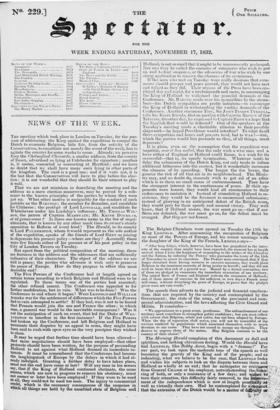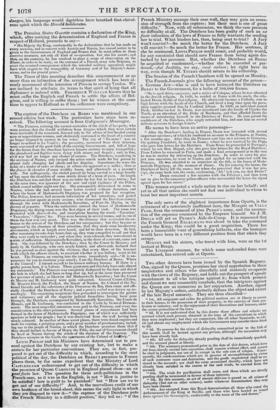The Belgian Chambers were opened on Tuesday the 13th by
King LEOPOLD. After announcing the recognition of Belgium ny most . of the Powers of Europe, and his recent marriage with the daughter of the King of the French, LEOPOLD says— "After long delays, which, however, have been less prejudicial to the inter- ests of the country than might have been expected, the moment has at length arrived when 1 have the happiness of responding to the wishes of the Chamber and the Nation, by inducing the Powers who guarantee the treaty of the 15th of November to assure its execution. The Powers were convinced, that if they longer abstained from having recourse to coercive measures, they would pine Belgium in the imminent necessity of doing justice to herself; and they did not wish to incur that risk of a general war. doing by a formal convention, two of them arc pledged to commence the immediate evacuation of our territory. The united fleets of France and England restrain the commerce of Holland; and, if these means of coercion be not sufficient, in two days a French army will come, without disturbing the peace of Europe, to prove that the pledges given were not vain words."
The speech then adverts to the judicial and financial ameliora- tions that are required by the country and contemplated by the Government; the state of the army, of the provincial and com- munal administration, and the laws affecting the Civic Guard and Militia. It concludes— "We approximate to a great event, gentlemen. The enfranchisement of our territory must contribute to strengthen public confidence; but you must reflect with sorrow that Belgium, whole and entire, has not been adopted by Europe. When the day of separation shall arrive, you will not be unmindful of the services rendered by populations which associated themselves with so much devotion to our cause. They have not ceased to occupy my thoughts. They deserve to engross those of the nation. May Belgium continue to be the country of their choice!"
The Morning Herald complains of this document as dull and spiritless, and lacking chivalrous feeling. Would the Herald have had LEOPOLD, like Bobby Acres, begin with a " darame?" For our part, we look upon the moderate tone of the speech as well becoming the gravity of the King and of the people; and as indicating, what we believe to be the case, that LEOPOLD looks and wishes his subjects to look on the dispute between them and Holland as wholly at an end; that he anticipates no resis from General CHASSE or his employer, notwithstanding the cing of both, or only a resistance of a few days; and turn their attention, this difficulty fairly removed, to the es"zi ment of the independence which is now at length praeti well as virtually their own. Had he contemplated for aoneraent that the extrusion.Of the Dutch would- be a matter of diftdult$ • clanger, his language would dckubtless have breathed that chival- rous spirit which the Herakidesiderates.



























